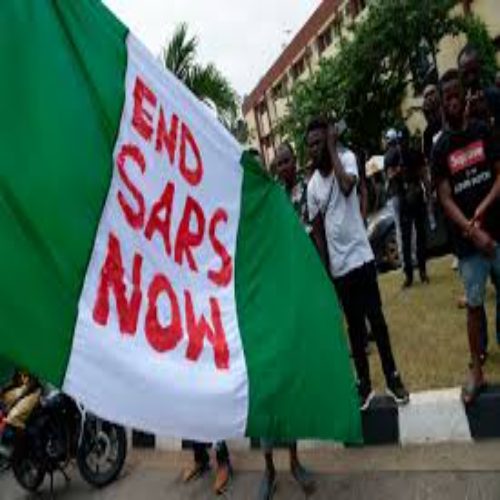
On the night of October 20, 2020, military personnel arrived at the Lekki Toll Gate in Lagos, confronting protesters who were peacefully gathered behind road barriers, singing the national anthem in the dark. The situation escalated quickly as the military opened fire, targeting the crowd with live ammunition, not just firing into the air as initially claimed.
This marked a pivotal moment in the widespread #EndSARS protests across Nigeria, which were driven by anger over police brutality, especially the actions of the Special Anti-Robbery Squad (SARS). Initially, the protests focused on ending police violence, but they evolved into a broader demand for better governance, economic opportunities, and improved living conditions for young Nigerians.
The events of that night, which were broadcast live by musician DJ Switch, have remained a point of contention. Despite conflicting reports, protesters and international observers have continued to call for justice and accountability.
In the aftermath, President Muhammadu Buhari acknowledged the disbanding of SARS but described the protests as misguided and exploited by individuals with ulterior motives. However, his speech largely ignored the October 20th incident, disappointing many who hoped for a more direct response.
Disputes Over the Facts
The Nigerian military and the Lagos state government have been at odds over who was responsible for the events at the Lekki toll gate. The military initially denied its involvement, labeling media reports as fake news. The Lagos state governor also denied that there were casualties, while claiming he had no authority over the military’s actions.
Subsequent investigations, including those by Amnesty International and DFRLab, confirmed that the military was present at the scene and that they did indeed open fire, contradicting their earlier claims. At least 12 deaths were reported the following morning, with one victim dying on camera during a live stream.

Ongoing Judicial Inquiry
In response to the protests, various states in Nigeria have established judicial panels to investigate allegations of police brutality. These hearings aim to hold the SARS unit accountable, with the Lagos panel also looking into the events of October 20th. Filmmaker Editi Effiong has been documenting the proceedings on social media, emphasizing the need for justice, although the potential outcomes of these hearings remain uncertain.
Ongoing Targeting of Protest Figures
Despite the formation of these panels, some key figures involved in the protests have faced harassment. Modupe Odele, who worked to secure the release of detained protesters, had her passport confiscated in November, and Eromosle “Eromz” Adene, a musician involved in the protests, was arrested and charged with several offenses, including cyberstalking and inciting public disorder.
Reports indicate that many other protesters detained during the unrest remain in custody, even after the protests were disrupted by criminal elements.
UK Parliamentary Hearing
On November 23, 2020, the UK Parliament held a hearing to discuss the Nigerian government’s handling of the #EndSARS protests and the Lekki shooting. British lawmakers, including Kate Osamor and Lyn Brown, criticized the Nigerian government for continuing to fund and train the SARS unit, despite claims of its disbandment. They called for sanctions against Nigerian officials and military leaders involved in the violence, emphasizing the need for greater international support for anti-corruption and economic development initiatives in Nigeria.
The hearing also garnered significant public support, with over 200,000 people signing a petition calling for action. The UK Parliament voted in favor of imposing sanctions on those responsible for the violence and human rights abuses during the protests.


